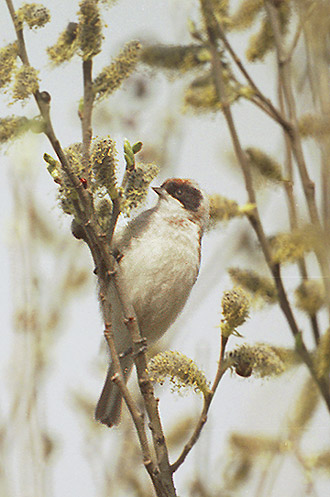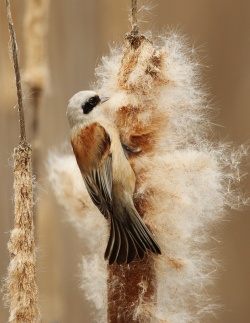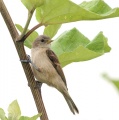(→External Links: Additional GSearch for common name. Video link deleted as no longer available. GSearch checked template) |
(→External Links: Multiple GSearches combined) |
||
| Line 49: | Line 49: | ||
{{ref}} | {{ref}} | ||
==External Links== | ==External Links== | ||
| − | + | {{GSearch|"Remiz pendulinus" {{!}} "Penduline Tit"}} | |
| − | {{GSearch|Remiz | ||
| − | |||
| − | |||
{{GS-checked}} | {{GS-checked}} | ||
<br /> | <br /> | ||
Revision as of 21:01, 16 November 2022
- Remiz pendulinus
Identification
10–11 cm (4-4¼ in)
- Light grey head and nape
- Black mask
- Reddish-brown upperparts
- White to orangey-buff underparts
- Male has reddish breast spots
Female has a narrower facial mask
Distribution
Throughout much of Eurasia. Has bred in Belgium and Finland.
A rare visitor to Britain, but becoming more regular.
Taxonomy
Subspecies
There are 4 subspecies[1]:
- R. p. pendulinus:
- R. p. menzbieri:
- R. p. caspius:
- North-western Kazakhstan (Volga and Ural plains) to Caspian Sea
- R. p. jaxarticus:
- Eastern Urals to western Siberia and northern Kazakhstan
Habitat
Reed beds, ponds and ditches.
Behaviour
Diet
Their diet consists mostly of small insects and invertebrates, their eggs and larvae. They also eat some seeds.
Breeding
Polygamous.The nest is suspended from a branch and is made from wool, animal hair, soft plant materials bound with spiders' web. The eggs may be deserted by both adults, while they go in search of another partner.
Vocalisation
Gallery
Click on images to enlarge
Juvenile
Photo © by Cristian Mihai
Gradistea (IF), Romania, June 2009
References
- Clements, J. F., T. S. Schulenberg, M. J. Iliff, D. Roberson, T. A. Fredericks, B. L. Sullivan, and C. L. Wood. 2015. The eBird/Clements checklist of birds of the world: v2015, with updates to August 2015. Downloaded from http://www.birds.cornell.edu/clementschecklist/download/
- Collins Field Guide 5th Edition
- Handbook of the Birds of the World Alive (retrieved January 2016)
- Animalfacts.net
- Wikipedia
- BirdGuides
Recommended Citation
- BirdForum Opus contributors. (2024) Eurasian Penduline Tit. In: BirdForum, the forum for wild birds and birding. Retrieved 4 June 2024 from https://www.birdforum.net/opus/Eurasian_Penduline_Tit
External Links
GSearch checked for 2020 platform.







